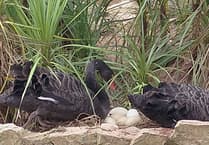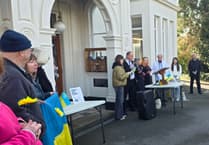Toilet Twinning may sound like a bit of a joke - but far from it. It is a charity that is fulfilling a desperate need for improved health and sanitation in impoverished countries around the world, writes Bruce Pell of Dawlish Water Rotary.
The amazing work done by Toilet Twinning in funding toilets, clean water and hygiene was illustrated to members of Dawlish Water Rotary Club at their last Zoom meeting by charity CEO Lorraine Kingsley.
She emphasised that a quarter of the world’s population – some 1.7 billion people – still don’t have a proper toilet and that, worldwide, a child dies every two minutes from a disease linked to poor sanitation.
With access to clean water and a toilet, and knowledge about the importance of handwashing, people’s health improves: they are well enough to farm their land, and their children are well enough to go to school and finish their education.
The lack of toilets particularly affects girls who, without toilets, drop out of school and women generally who are forced to use toilets after dark, thus leaving themselves open to assault, violence and possibly rape.
Toilet Twinning invites you to donate £60 to ‘twin’ a loo, working through a network of local partners in more than 20 countries.
The Dawlish Water club is to look at supporting this project. One member, Rotarian Ed McLaughlin, has already been a supporter and says: ‘This is a charity that is well worth supporting as it goes a long way towards emancipating people in rural and semi-urban areas. I have twinned our toilet with one in Zambia and we gave our son and his wife a Christmas present of a toilet twinned with theirs, this time in South Sudan.’
Incidentally in 1907 the Rotary Club of Chicago, under the leadership of Rotary International Founder Paul Harris, initiated the first Rotary public service project by creating a public comfort station (also known as a public toilet)
Rotarians also had a fascinating talk on the First World War and its effect on Dawlish recently by Bob Vickery, who has carried out extensive research. A total of 124 men and one woman, with links to Dawlish, died in the service of their country.




